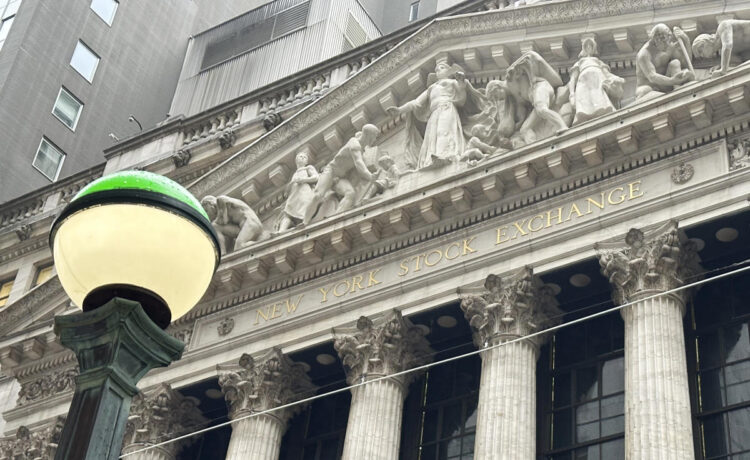NEW YORK (AP) — U.S. stocks are ticking higher, and oil prices are easing Monday with hopes that international efforts to calm escalating tensions in the Middle East may help. The latest report on the U.S. economy to blow past expectations also helped support financial markets.
The S&P 500 was 0.3% higher in afternoon trading to recover some of its loss from last week, which was its worst since October. The Dow Jones Industrial Average was up 163 points, or 0.4%, as of 12:01 p.m. Eastern time, and the Nasdaq composite was 0.1% higher.
Goldman Sachs rose 3.7% and helped financial companies climb to some of the market’s biggest gains after reporting stronger profit for the start of the year than analysts expected. The pressure is on companies broadly to deliver fatter profits because the other lever that sets stock prices, interest rates, looks less likely to offer support in the near term.
A measure of nervousness in the stock market eased, and the price of benchmark U.S. crude oil fell 1.3% as political leaders around the world urged Israel not to retaliate after Iran’s attack on Saturday involving hundreds of drones, ballistic missiles and cruise missiles.
Financial markets had been nervous heading into the weekend. The worry was that an attack by Iran could widen Israel’s war with Hamas and ultimately constrict the flow of crude oil. But Israel said 99% of the drones and missiles were intercepted as diplomats urged a de-escalation and the U.S. administration made clear it did not support a wider war with Iran.
Brent crude, the international standard, fell 1.3% to $89.23 per barrel.
This year’s jump in oil prices has been raising worries about a knock-on effect on inflation, which has remained stubbornly high. After cooling solidly last year, inflation has consistently come in above forecasts in each month so far of 2024. That has pushed investors to give up hopes for imminent cuts to interest rates. They’re broadly forecasting just one or two cuts for this year, according to data from CME Group, down from six or more at the start of this year. Some are bracing for no cuts to rates.
Not only are higher oil prices threatening to keep inflation and interest rates higher, so is a remarkably resilient U.S. economy. A report on Monday showed that U.S. shoppers increased their spending at retailers last month by much more than economists expected. Such spending, which has been supported by a still-solid job market, has pushed many economists to at least delay their forecasts for a possible recession because of high interest rates.
The downside of such strength is that it likely delays cuts to interest rates, which Wall Street craves because they goose prices for stocks and all kinds of investments, while easing the pressure on the economy. But the upside of a strong economy is that it hopefully fuels strong growth in profit for companies.
“If inflation is sticky because of momentum in the economy, that’s not necessarily bad for stocks,” Bank of America strategists led by Ohsung Kwon wrote in a BofA Global Research report. “But stagflation is,” referring to the painful combination of a stagnating economy and high inflation.
M&T Bank jumped 6.2% for one of the biggest gains in the S&P 500 after reporting profit for the first quarter that was slightly above analysts’ expectations. It also said it slightly shrunk the amount of pain that it would take if the pressured commercial real-estate industry sinks sharply.
Charles Schwab rose 4.1% after also edging past analysts’ forecasts for its profit last quarter.
Strategists at Wells Fargo Investment Institute raised their forecast for where the S&P 500 could end this year in part because the resilience of the U.S. economy pushed them to upgrade their forecasts for it. While they expect the market to be choppy following its big gains since October, they say a growing U.S. economy should drive sales for companies.
On the losing end of Wall Street were utility stocks and real-estate investment trusts. They pay relatively high dividends, and they typically come under pressure when bond yields are rising because that could draw away investors looking for income.
Treasury yields rose following the strong U.S. retail sales report. The yield on the 10-year Treasury rose to 4.64% from 4.52% late Friday. The two-year yield, which moves more closely with expectations for action by the Federal Reserve, climbed to 4.95% from 4.89%.
American Water Works slipped 0.4%, and office owner Boston Properties fell 1.5%.
In stock markets abroad, indexes rose across much of Europe. They struggled more in Asia, where Hong Kong’s Hang Seng and Tokyo’s Nikkei 225 both fell 0.7%.
___
AP Writers Matt Ott and Zimo Zhong contributed.













